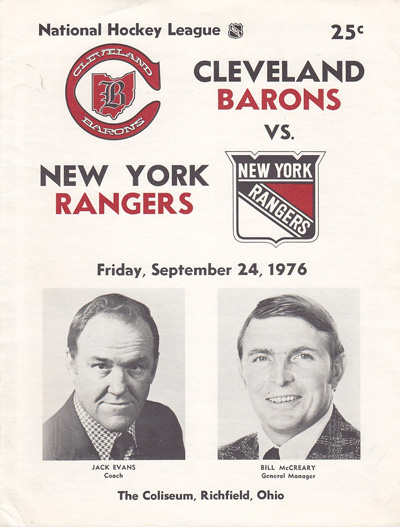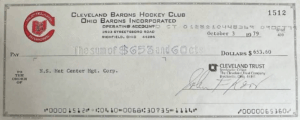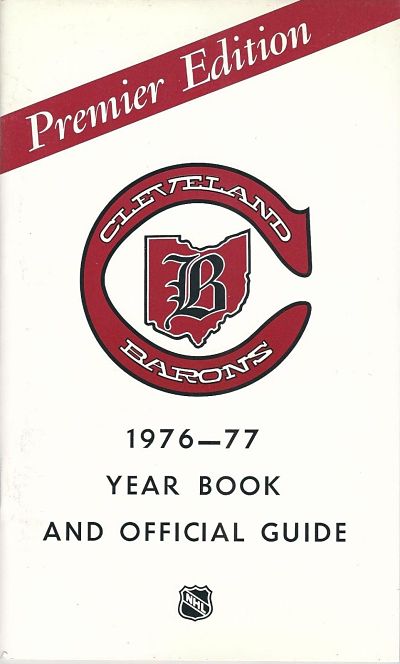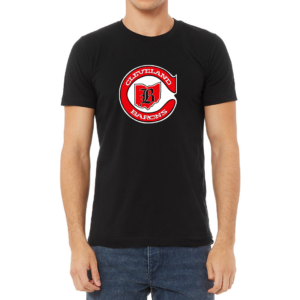National Hockey League (1976-1978)
Tombstone
Born: July 14, 1976 – The California Golden Seals relocate to Cleveland, OH.
Died: June 14, 1978 – Merger with Minnesota North Stars
First Game: October 6, 1976 (T 2-2 vs. Los Angeles Kings)
Last Game: April 9, 1978 (L 3-2 vs. Pittsburgh Penguins)
Stanley Cup Championships: None
Arena
Richfield Coliseum
Opened: 1974
Demolished: 1999
Marketing
Team Colors:
Ownership
Owners:
- 1976-1977: Melvin Swig & George Gund
- 1977-1978: George Gund & Gordon Gund
Background
Cleveland flirted with the National Hockey League a number times over the years. The city’s minor league club, the Cleveland Barons (1929-1973), were wildly popular in the post War period. The Barons applied unsuccessfully for admission to the NHL during the 1950’s. And believe it or not, the Montreal Canadiens even considered a move to Ohio during the Great Depression.
Major League hockey finally arrived in 1972 with the formation of the World Hockey Association. The WHA sought to challenge the NHL and made an immediate splash by luring away NHL stars such as Bobby Hull, Bernie Parent and Derek Sanderson. Nick Mileti, owner of the Barons and the NBA’s Cleveland Cavaliers, secured a WHA franchise for Cleveland, to be known as the Cleveland Crusaders.
The debut of the Crusaders in the fall of 1972 marked the end of the Barons era after nearly 50 years. Mileti shipped his minor league club out of town to Jacksonville, Florida in January 1973. Mileti also set about development of an 18,000-seat modern arena for his Cavs and the Crusaders franchises – the Richfield Coliseum.
The Coliseum opened in 1974 in a rural area between Cleveland and Akron. The Crusaders failed to catch fire during four seasons in Cleveland Barons, either downtown at the old Cleveland Arena or at the gleaming new Coliseum. By the spring of 1976 the WHA club was on its last legs. New Crusaders owner Jay Moore reportedly held talks to lure the NHL’s troubled Kansas City Scouts to the Richfield Coliseum to replace his WHA club. Cleveland was on the verge of its long-awaited NHL moment. But it wouldn’t involve Moore or his flirtation with the lowly Scouts.

1976: California Golden Seals Move to Cleveland
Across the country, San Francisco hotelier Mel Swig watched an arena deal for his California Golden Seals NHL franchise collapse. Swig’s minority partner in the Seals was George Gund, a scion of Cleveland’s Gund banking family. With hopes for a new arena in the Bay Area dead, Gund persuaded Swig to move the Seals to his native Cleveland Barons. The NHL approved the move on July 14, 1976. The WHA’s Crusaders moved to St. Paul, Minnesota in early August. Swig and Gund revived the old Barons moniker for their franchise, hoping to re-kindle Cleveland’s hockey glory days. By the time the ink was dry, the Barons had just six weeks to promote the arrival of the NHL in Cleveland before opening night.
Things went sideways immediately. Four of the Barons’ first eight homes games attracted fewer than 4,000 fans to the Richfield Coliseum. The Barons remained in the brutal Adams Division, where the Seals finished in last place the prior two seasons. The Boston Bruins and Buffalo Sabres were league powers of the era. The Toronto Maple Leafs were competitive. The Barons languished in a distant 4th place.
Financial Crisis & Bailout
By January 1977, just six months into the Cleveland experiment, majority owner Mel Swig was financially exhausted. He petitioned his fellow NHL owners for a loan to keep the Barons afloat through the end of the 1976-77 season. Then he proposed his players defer 27.5% of their paychecks for five months. On January 31, 1977, Swig missed the team’s payroll. Just as it appeared the Barons would humiliate the NHL by folding in midseason, NHL Players Association chief Alan Eagleson brokered a last minute deal. The union loaned the club $600,000, matched by $350,000 from Swig and $20,000 from each of the other NHL clubs. The $1.3 million bailout allowed the Barons to finish the season.
The Barons finished the 1976-77 in last place in the Adams Division with a 25-42-13 record. Seals holdover Dennis Maruk led the team in scoring with a 28-50-78 line. In June 1977, Swig sold the Barons to George Gund and his brother Gordon for $5.3 million in cash and promissory notes. The Barons now had committed local ownership and a full offseason to promote the team for the first time. It didn’t matter.
Final Campaign & Merger with Minnesota North Stars
On the ice, the 1977-78 Barons performed a near replica of the previous winter’s futility. They finished last in the Adams Division with a 22-45-13 record. Dennis Maruk led the team once again with 36 goals and 35 assists. Behind the scenes, the Barons didn’t experience the degree of acute financial peril that they had the previous winter under Swig’s ownership. But attendance remained distressingly low at the Coliseum. The Barons made their final appearance on April 9th, 1978, losing to the Pittsburgh Penguins in front of 7,364 in Richfield. Over the course of two NHL seasons the Barons never once sold out a game.

In June 1978, the NHL allowed a merger of the Barons with another financially distressed club, the Minnesota North Stars. As part of the transaction, the Gund brothers took over ownership of the North Stars and the Barons ceased to be.
The death of the Barons on June 14th, 1978 stands as the last time a franchise in one of the “Big Four” North American sports leagues (NFL, NBA, NHL and MLB) went out of business.
Our friends at the Good Seats Still Available podcast did an episode on the Cleveland Barons:
Cleveland Barons Shop
Cleveland Barons hoodie and T-shirt from Royal Retros:
Sweatshirt also available in black. T-shirt also comes in red and gray.
Cleveland Barons Video
The Barons host the Pittsburgh Penguins at the Richfield Coliseum. October 1977.
In Memoriam
Original club owner Melvin Swig died of cancer on May 14, 1993 at the age of 75. New York Times obituary.
Head Coach Jack Evans died of prostate cancer on November 10, 1996 at age 68.
Barons co-owner George Gund III passed away on January 15, 2013 after a bout with stomach cancer. Gund was 75 years old.
Links
##



